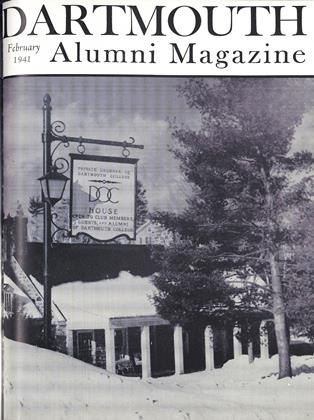As far as we're concerned McLaughry's initial meeting with just a few of the players has already won him his first step toward a good year in 1941 and a happy stay at Dartmouth. For there is no use in hiding the fact that the Indian players were stunned on learning that Mr. Blaik and all his assistants were no longer going to be with them. The respect that the Dartmouth players had for the staff and the complete confidence that they had in their knowledge of football was terrific. They have also known for a long time that Mr. Blaik has long considered Tuss one of the best in the business, because he has often told them this. They have also realized for a good many years that Coach Blaik's closest friend in the coaching ranks has been DeOrmond McLaughry. Hence many felt that they knew him before they ever met him, and many have made previous contacts with him when he, as the Brown coach, came quite often to visit in Hanover.
This also seems to be the proper time to say that Dartmouth football will profit for a great many years from the groundwork that Blaik and his staff built during their reign in Hanover. For example, it has been Trainer Rollie Bevan's idea in other years to take the players not otherwise engaged in sports and give them a systematic workout three afternoons a week on body building ing exercises, to strengthen wrists, knees, and stomach muscles, and otherwise mould bigger and stronger men. That the value of this preliminary work has been thoroughly embedded in the minds of the individuals as evidenced by the continuation of these classes without direction speaks well of the future of Dartmouth football, and is at the same time an eloquent tribute to Bevan, who certainly should be called one of the finest trainers connected with football, if not the finest.
Of greater import is the fact that Dartmouth football in recent years has been built on the premise that it takes sacrifices to make a good eleven, that it requires a lot of hard work, and that the twins—blocking and tackling—are the only positive roads to football success no matter what other frills are added. The departure of the staff for the Army is Dartmouth's great loss and the Academy's great gain, and it is indeed fortunate that there was such a coach available as McLaughry to carry on and forward.
Among the first major problems facing Tuss is that of selecting his assistants. Director McCarter has stated that he will have a free hand in this matter. This is a judicious move. Few coaches know more men in the ranks than McLaughry, who has been president of the Football Coaches Association in the past and is now Secretary-Treasurer of that organization. During his one day visit, McLaughry frankly admitted that he is going to take his time in making his choices. That he will come up with a more versatile staff than he has ever had at his disposal in Providence is a surety. That his assistants may not immediately compare with nationally famous aides like Harry Ellinger, Andy Gustafson and Specs Moore is another thing. But you may rest assured that as the assistants are announced, each will have been given careful thought.
 View Full Issue
View Full Issue
More From This Issue
-
 Article
ArticleClassicist Not Without Honor
February 1941 By Donald Bartlett '24 -
 Article
ArticleA Kind and Comfortable House
February 1941 By S. C. H. -
 Article
ArticleThe Undergraduate Chair
February 1941 By Charles Bolte '41 -
 Class Notes
Class Notes1924*
February 1941 By ALFRED A. ADAMS JR. -
 Class Notes
Class Notes1939*
February 1941 By ROBERT W. GIBSON -
 Class Notes
Class Notes1921*
February 1941 By CHARLES A. STICKNEY JR.
R. H. Britton Jr. '42
-
 Sports
SportsLou YOUNG STANDS OUT
November 1940 By R. H. Britton Jr. '42 -
 Sports
SportsBig Green Teams
February 1941 By R. H. Britton Jr. '42 -
 Sports
SportsNEW ATTACK THRILLING
February 1941 By R. H. Britton Jr. '42 -
 Sports
SportsFOUR TIES PLAYED
February 1941 By R. H. Britton Jr. '42 -
 Sports
SportsWithin These Walls
February 1941 By R. H. Britton Jr. '42 -
 Article
ArticleWithin These Walls
March 1941 By R. H. Britton Jr. '42
Sports
-
 Sports
SportsGREEN HARRIERS FINISH EIGHTH
January, 1925 -
 Sports
Sports1948 Varsity Football Roster
October 1948 -
 Sports
SportsIndian Items
November 1937 By "Whitey" Fuller '37 -
 Sports
SportsWITH THE BIG GREEN TEAMS
OCTOBER 1962 By Dave Orr ’57 -
 Sports
SportsSoccer
January, 1931 By Ernest L. Barcella -
 Sports
SportsCORNELL 20, DARTMOUTH 13
December 1945 By Francis E. Merrill '26


